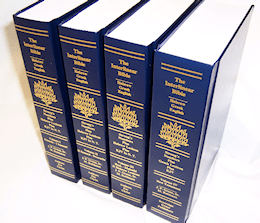Textus Receptus Bibles
Jay P. Green's Literal Translation 1993
| 20:1 | In those days Hezekiah was sick to death, and Isaiah the prophet, the son of Amoz, came to him and said to him, So says Jehovah, Order your house, for you are dying, and shall not live. |
| 20:2 | And he turned his face to the wall, and prayed to Jehovah, saying, |
| 20:3 | I pray to You, O Jehovah, please remember how I have walked always before your face in truth, and with a perfect heart, and I have done the good in Your eyes. And Hezekiah wept with a great weeping. |
| 20:4 | And it happened when Isaiah had not gone out to the middle court, the word of Jehovah came to him, saying, |
| 20:5 | Return, and you shall say to Hezekiah the leader of My people, So says Jehovah, the God of your father David, I have heard your prayer; I have seen your tears; behold, I will heal you; you shall go up to the house of Jehovah the third day. |
| 20:6 | And I have added fifteen years to your days; and I will deliver you and this city out of the hand of the king of Assyria, and shall defend this city for My own sake, and for My servant David's sake. |
| 20:7 | And Isaiah said, Take a cake of figs; and they took and laid it on the boil; and he recovered. |
| 20:8 | And Hezekiah said to Isaiah, What will be the sign that Jehovah will heal me, that I will go up on the third day to the house of Jehovah? |
| 20:9 | And Isaiah said, This will be the sign to you from Jehovah, that Jehovah will do the thing that He has spoken: Shall the shadow go forward ten steps, or shall it turn back ten steps? |
| 20:10 | And Hezekiah said, It would be a light thing for the shadow to go down ten steps; no, but let the shadow go back ten steps. |
| 20:11 | And Isaiah the prophet cried to Jehovah; and He brought back the shadow by the steps the shadow had gone down on the sundial of Ahaz, ten steps backward. |
| 20:12 | At that time Berodach-baladan, the son of Baladan the king of Babylon, sent letters and a present to Hezekiah, for he heard that Hezekiah had been ill. |
| 20:13 | And Hezekiah listened to them, and showed them all the house of his treasury, the silver and the gold, and the spices, and the precious ointment, and all the house of his weapons, and all found in his treasure house; there was not a thing that Hezekiah did not show them in his house and in all his dominion. |
| 20:14 | And Isaiah the prophet came in to king Hezekiah and said to him, What did these men say? And where did they come from to you? And Hezekiah said, They have come from a land afar off, from Babylon. |
| 20:15 | And he said, What did they see in your house? And Hezekiah said, They saw all that is in my house; there was not a thing that I did not show them among my treasures. |
| 20:16 | And Isaiah said to Hezekiah, Hear the word of Jehovah: |
| 20:17 | Behold, the days are coming when all that is in your house, and all that your fathers have treasured up until this day, shall be carried to Babylon; there shall not a thing be left, says Jehovah. |
| 20:18 | And of your sons that shall issue from you, whom you shall father, they shall take away, and they shall be eunuchs in the palace of the king of Babylon. |
| 20:19 | And Hezekiah said to Isaiah, The word of Jehovah that you have spoken is good. And he said, Is it not good if peace and truth are in my days? |
| 20:20 | And the rest of the acts of Hezekiah, and all his might, and how he made the pool, and the conduit, and brought in the waters to the city, are they not written in the Book of the Matters of the Days of the Kings of Judah? |
| 20:21 | And Hezekiah lay with his fathers. And his son Manasseh reigned in his place. |

Green's Literal Translation 1993
Green's Literal Translation (Literal Translation of the Holy Bible - LITV), is a translation of the Bible by Jay P. Green, Sr., first published in 1985. The LITV takes a literal, formal equivalence approach to translation. The Masoretic Text is used as the Hebrew basis for the Old Testament, and the Textus Receptus is used as the Greek basis for the New Testament.
Green's Literal Translation (LITV). Copyright 1993
by Jay P. Green Sr.
All rights reserved. Jay P. Green Sr.,
Lafayette, IN. U.S.A. 47903.